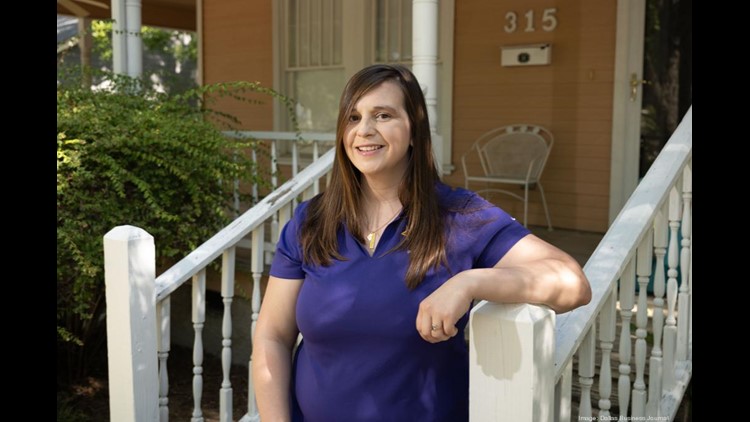IRVING, Texas — Family Promise of Irving executive director Aubrey Pi believes homelessness doesn’t start when someone gets evicted.
Pi argues that homelessness begins when a person’s rent increases to just $200 a month.
“$2,400 in a year when a family is barely paying the rent every month goes a long way,” Pi said. “What is the solution? I wouldn’t say that one solution is going to truly fix the problem. But I also know that the number of affordable housing opportunities is far smaller than the ability for families to rent.”
According to the National Low Income Housing Coalition’s 2021 Out of Reach report, a minimum wage worker would need to work an average of 100 hours a week to afford a one-bedroom apartment at a fair market rate in Texas. In Dallas County specifically, they would need to work 120 hours a week to be able to afford a one-bedroom apartment and 143 hours for a two-bedroom. Workers would need to earn at least $21.81 an hour to afford a one-bedroom apartment and $26 to afford a two-bedroom rental at a fair market rate in Dallas.
Nationally, the report finds that minimum wage workers can’t afford a one-bedroom apartment in 93% of U.S. counties or a two-bedroom apartment in any county in the country. More than 7.5 million low-income renters are severely housing cost-burdened and spend more than half of their income on rent.
“When you’re paying more than 35% of your income towards rent, it takes away from your ability to afford every other day’s expenses,” Pi said. “When that happens, a snowball effect occurs quite frequently where a family or an individual is unable to pay one or two bills one month, and then those bills just rack up one after another.”
Family Promise is a national organization aimed at helping low-income families and families experiencing homelessness become self-sufficient. With over 200 affiliates across 43 states, the nonprofit assists families overcome barriers they have accessing housing.
“Whatever their income is, our goal is to ensure that not only do they get into affordable housing but also that they have employment that is going to be able to allow them to earn a living wage,” Pi said.
Pi spoke to the Dallas Business Journal about the increasing gap between rent and minimum wage and how it impacts a population that has historically struggled to access housing.
Can you tell me more about when you began noticing an increase in rent prices and how it’s impacting the people you serve?
I would say that it was long before [the pandemic]. When we look at barriers to accessing affordable housing, we’re addressing everything from pay to someone’s credit.
Before, apartments were where people who couldn’t rent a home or buy a home were sequestered because that’s what they could get into. Now, one family in our program was denied leasing an apartment in Euless because the gentleman who is applying for the apartment had too many registered phone numbers. How does your phone number even play a factor in your ability to access housing?
[With] another family I’m working with right now, the mom makes $20 an hour and has four kids. She applied for an income-based housing opportunity. She didn’t have a lapse in employment, but she started a new job in March. She applied for this apartment on May 4. She has yet to hear from the apartment about apartment availability.
As an income-based apartment complex, they flagged her application for extra income that she has not communicated. The extra income was a 401(k) that is contributed through her paycheck, but (it) has $39 in it. They required her, and as a case manager, I assisted, to reach out to the company to get a document that clearly states that this is all within 401(k). As if she’s sitting on some nest egg, she would rather stay homeless than bite into the 401(k) that she has. Again, why would our standard expectation be that someone blows their retirement for momentary hardship?
Who is most impacted by these rent hikes?
When it comes to looking at the numbers in regard to who has been disproportionately impacted by this rent hike and the lack of affordable housing, it is going to be people of color. When I say people of color, that’s a combination of not just African Americans, but those who would identify as Hispanic or Latino, Native Americans.
We had 16 families that we served in 2019, and 12 of those families were African American, two were mixed, and one was Hispanic. In 2020, just in shelter, not including those served through rental assistance, we had 11 African American [families], one Caucasian mixed family, two Hispanic families and two Caucasian families.
How do you see this playing out? Do you expect rent prices to continue to rise?
Yes. The families we serve are children in your classrooms, and they’re people you work with that you would never suspect were experiencing homelessness. The individuals we serve have jobs. We have three families in our program right now that have been denied food stamps on more than one occasion because they ‘make too much money,’ yet they’re homeless.
Our goal, yes, is to end homelessness, but in order to do so, we have to advocate for the people that we serve, which [includes] trying first to change the image of homelessness for society to truly understand the wage gap problem. But beyond that, there’s also the issue of the barriers to other services, such as simply applying to own a home.
These families could afford a mortgage, and apartment complexes require you to make two and three times the rent. Where these people could afford a mortgage, they can’t afford to live in an apartment complex. Yet, the apartment complex is the only place they have left because banks don’t approve people we work with for mortgages. They either don’t have a high enough credit score or don’t have the money they need to put for a down payment.
We make these things unattainable as a society, but we wonder why the housing crisis is a problem. It’s because investors buy properties and expect to easily gain a return on their investment off the backs of people who can’t afford to live elsewhere.
I don’t believe investors or property owners are the villains here because they’re trying to make their business work. Personally, as an organization, we work closely with a property owner here in Irving who offers very affordable rent. But they are one property.
How do we get more property owners like the one you work with? What does that have to look like?
There are some great people who truly want to help and make a change in our community. They support our organization tremendously, whether it’s volunteer time, money or donating goods and services. We do have great support in our communities. If it weren’t for that support, we wouldn’t be able to continue doing what we’re doing.
However, if you have over 50% of the people in your town who are rent burdens and you continue to cheer on these investors who are buying up properties, that’s great for one way. Yes, those businesses pay taxes. Yes, those businesses do bring revenue into the city, but at the same time, those same businesses are making rent unaffordable. Where do you find the balance? I am not sure.
Let’s say you have a property with 300 units, and you say 10% of your 300 units are ‘affordable,’ meaning you have 30 units available. 30 units out of 300 when you have over 50% of the population’s rent burden. How do those numbers equate? They don’t. There’s never going to be enough housing if everyone only does a little bit.
But at the same time, everyone doing a little bit goes along. Businesses are willing to hire people whether they’re entry-level or giving them an opportunity because they are single parents.
Yes, you have to, as a business, have a business model that serves the community with a certain expectation. However, at the same time, if [these families were] given leniency and their job weren’t lost, then would they have not become homeless? Absolutely.
This interview has been edited for clarity and brevity.



